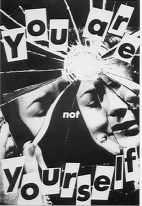
For this lecture, read the first 5 chapters of Lyotard’s The Postmodern Condition.
Postmodernism reverses conceptions that arose with the European Enlightenment and modernity about the progress of reason and the exclusive identity of Western culture. Recall that Hegel, Marx and Comte saw history as a necessary unfolding of European progress through reason without the possibility of regression. The accelerating development of science and technology which originally supported exclusive understandings of Western identity is also undermining the distinction via counterculture. In the 1980s, this included the use of video technology, and then in the 1990s it was extended considerably by the explosion of the internet. The Bay Area, one of the most diverse places in America, is a major center of fusion culture as well as internet innovation. While there are countless interesting examples of Postmodern art, particularly architecture and literature, we will focus on the major influential Postmodern philosophers and their core ideas.
Jean-Francois Lyotard (1924 – 1998), pronounced “leo-TAR”, is often mentioned with Postmodernism because he was centrally concerned with the impact it was having on thought and culture. He is of the same family as the famous trapeze artist known for his one-piece gymnastic garb, for whom the song The Man on the Flying Trapeze was composed and from whom the gymnastic wear gets its name. Lyotard taught in Algeria, Brazil and California before settling in Paris in 1968, the year of the New Left student protests in Paris, an event that had a major impact on all four of the French Postmodernists we will study today. Lyotard was a Post-Marxist socialist who was critical of the Soviet Union and Stalin. Like other Postmodernists, Lyotard argued that there will be no grand revolution that paves the way to utopia, so the best political strategy for progressives is to offer alternatives to the dominant culture and system that do not seek to become dominant.
Unlike Saussure and Lacan, Lyotard was critical of the idea that thought is structured as a language. Like Wittgenstein, Lyotard argued that our thinking is very much structured by and often incorporates language, but that our mind can picture reality in various complex ways that do not have an underlying consistent structure like language or grammar. This is very notable in dreams, which not only show us the power of the mind to create worlds of experience but also the fragmented and discontinuous manner of thought and reason.
Lyotard’s most famous work, The Postmodern Condition: A Report on Knowledge (1979), is regarded as one of the central works of Postmodernism. Much like Levi-Strauss, Latour and Barthes, who argue that all cultures engage in symbolic mythology, Lyotard argues that all cultures legitimate themselves through the telling and retelling of narratives, stories that give each culture purpose and meaning. At a time when computer technology was just beginning to bring vast changes to communication, thought and culture, Lyotard argues that the training of critical minds is being eclipsed by storage of data and governments are being replaced by multinational corporations. All of this must be legitimated by a narrative, and so the story of the European Enlightenment and the Age of Reason separating the West from the rest becomes central to the creation of meaning, a metanarrative. The heroic West, it is said, brings freedom to the world through democracy and reason to the world through science. Lyotard compares this story of salvation to similar metanarratives found in Christianity and Marxism. Without the faithful retelling and circulation of this metanarrative, Moderns, as Latour would say, would have little idea what their culture means.
Unfortunately, Lyotard argues, the metanarrative was unmasked for many by the horrors of WWII, particularly the highly mechanized genocide at Auschwitz, which spawned the countercultural attacks on the metanarrative of the fifties, sixties and seventies. While all can agree that Western culture engages in the practices of science and democracy, counterculturals begin wondering aloud if the story of progress is merely a mask for brutality and whether the West is merely like the rest, wallowing in ignorance and authoritarianism. Consider Jack Kerouac, who wrote of the “beat generation”, the beatnik youth of the fifties who turned from American conformity, tired and disillusioned after WWII and unfaithful to the Korean War and consumerism. Consider the Civil Rights Movement of the sixties, that called for revolutionary changes to the American practice of democracy which openly excluded and oppressed many Americans who were seen as Other due to ethnicity and gender.
Lyotard argues that Postmodernism is a playful engagement with multiple conflicting micro-narratives that have emerged in the space created by the questioning of the grand metanarrative. He was predictably attacked by critics who argued that Postmodernism and the end of the metanarrative was itself a new metanarrative. Lyotard countered that the metanarrative of the progress of the West is not dead, but actively contradicted by some countercultures. For many, the dominance of First World, the environmental impact of technology and the supremacist nature of the metanarrative is unquestioned, either out of ignorance or with regret that has no faith in an alternative. Our obsession with precision limits the scope of our vision. It is this limitation that Postmodern thought and art hope to counteract by disturbing the dominant forms of cultural coherence. Critics of Lyotard and Postmodernism continue to ask whether this is a cure for the condition or merely another symptom. Is Postmodernism, like the narrative of modernity, genuine liberation, or is it merely a safety valve to accommodate scholars and gallery goers who are disenchanted but still require entertainment?






